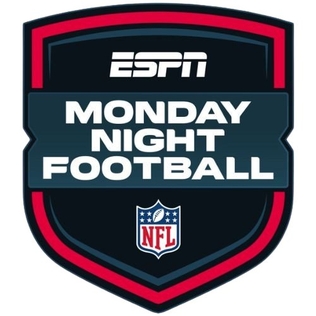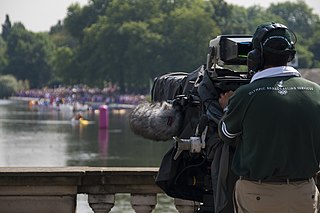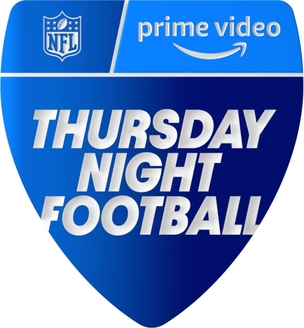Blitz, German for "lightning", may refer to:

Monday Night Football is the branding used for broadcasts of National Football League (NFL) games that primarily broadcast on Monday nights. It was originally broadcast on ABC from 1970 to 2005, before moving exclusively to sister network ESPN in 2006, which remains the main channel for the broadcast. In 2020, MNF returned to ABC in select simulcasts with ESPN, and in 2022, it began featuring select exclusive ABC telecasts. In addition, ESPN2 has aired alternate telecasts of selected games since 2020 as the Manningcast, while ESPN+ has streamed MNF simulcasts in the United States since 2021.

Howard William Cosell was an American sports journalist, broadcaster and author. Cosell became prominent and influential during his tenure with ABC Sports from 1953 until 1985.

Alan Richard Michaels is an American television play-by-play sportscaster for Thursday Night Football on Amazon Prime Video and in an emeritus role for NBC Sports. He has worked on network sports television since 1971, with his most recent work being with NBC Sports after nearly three decades (1976–2006) with ABC Sports. Michaels is known for his many years calling play-by-play of National Football League (NFL) games, including ABC Monday Night Football from 1986 to 2005 and NBC Sunday Night Football from 2006 to 2021. He is also known for famous calls in other sports, including the Miracle on Ice at the 1980 Winter Olympics and the earthquake-interrupted Game 3 of the 1989 World Series.

Francis Newton Gifford was an American football player, actor, and television sports commentator. After a 12-year playing career as a halfback and flanker for the New York Giants of the National Football League (NFL), he was a play-by-play announcer and commentator for 27 years on ABC's Monday Night Football.

Keith Max Jackson was an American sports commentator, journalist, author, and radio personality, known for his career with ABC Sports (1966–2006). While he covered a variety of sports over his career, he is best known for his coverage of college football from 1952 until 2006, and his distinctive voice, "a throwback voice, deep and operatic. A voice that was to college football what Edward R. Murrow's was to war. It was the voice of ultimate authority in his profession."

The television rights to broadcast National Football League (NFL) games are the most lucrative and expensive rights of any sport in the world. Television brought professional football into prominence in the modern era after World War II. Since then, National Football League broadcasts have become among the most-watched programs on American television, and the financial fortunes of entire networks have rested on owning NFL broadcasting rights. This has raised questions about the impartiality of the networks' coverage of games and whether they can criticize the NFL without fear of losing the rights and their income.
ESPN on ABC is the branding used for sports event and documentary programming televised by the American Broadcasting Company (ABC) in the United States. Officially, the broadcast network retains its own sports division; however, in 2006, ABC's sports division was merged into ESPN Inc., which is the parent subsidiary of the cable sports network ESPN that is majority owned by ABC's corporate parent, The Walt Disney Company, in partnership with Hearst Communications.
Nationally television broadcasts of Major League Baseball (MLB) games have aired on ABC in various formats. The network first aired Saturday Major League Baseball Game of the Week games between 1953 and 1955, in 1960, and in 1965. ABC then televised MLB games from 1976 to 1989, airing Monday Night Baseball, Thursday Night Baseball, and Sunday Afternoon Baseball in various years during that period.

The broadcasting of sports events is the live coverage of sports as a television program, on radio, and other broadcasting media. It usually involves one or more sports commentators describing events as they happen.

TNT Sunday Night Football also known as NFL on TNT was the name for the series of National Football League (NFL) broadcasts on Sundays produced by Turner Sports for Turner Network Television (TNT).

Thursday Night Football is the branding used for broadcasts of National Football League (NFL) games that broadcast primarily on Thursday nights. Most of the games kick off at 8:15 Eastern Time.
Nationally television broadcasts of National Football League (NFL) games first aired on ABC from 1948 to 1951. Between 1970 and 2005, Monday Night Football aired exclusively on ABC. In 2006, ESPN took over as the exclusive rights holder to Monday Night Football, and the ABC Sports division was merged into ESPN Inc. by parent company Disney. Afterward, ABC did not broadcast any game from the NFL, whether exclusive or a simulcast from ESPN, until they simulcasted an NFL Wild Card playoff game in 2016. ABC would then return to Monday Night Football in 2020, when they aired three games as simulcasts from ESPN.
As of the 2022 NFL season, CTV and TSN broadcast Sunday games. Monday Night Football airs exclusively on TSN. TSN and CTV 2 own rights to Sunday Night Football and Thursday Night Football. RDS carries games in the French language from all timeslots. U.S. network television feeds may also be available, often from multiple markets, on cable and satellite ; all games are subject to simultaneous substitution. Monday Night Football also airs in simultaneous substitution with the ABC feed on CTV2 beginning with the 2023 season.
In 1980, 22 teams took part in a one-year cable deal with UA-Columbia. The deal involved the airing of a Thursday night Game of the Week in markets at least 50 miles (80 km) from a major league park. The deal earned Major League Baseball less than $500,000, but led to a new two-year contract for 40-45 games per season.
By 1969, Major League Baseball had grown to 24 teams and the net local TV revenues had leaped to $20.7 million. This is in sharp contrast to 1950 when local television brought the then 16 Major League clubs a total net income of $2.3 million. Changes baseball underwent during this time, such as expansion franchises and increasing the schedule from 154 games to 162, led to a wider audience for network and local television.

Sunday Afternoon Baseball is the de facto branding used for nationally televised live game telecasts of Major League Baseball games on Sunday afternoons during the regular season.
Sports programming on the American Broadcasting Company is provided on occasion, primarily on weekend afternoons; since 2006, the ABC Sports division has been defunct, with all sports telecasts on ABC being produced in association with sister cable network ESPN under the branding ESPN on ABC. While ABC has, in the past, aired notable sporting events such as the NFL's Monday Night Football, and various college football bowl games, general industry trends and changes in rights have prompted reductions in sports broadcasts on broadcast television.









